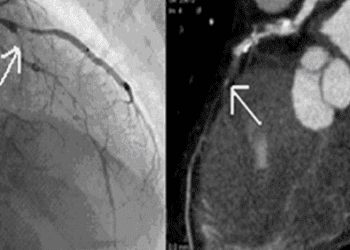The COMMIT trial: Metoprolol and clopidogrel in patients with acute MI [Classics Series]
Image: PD
1. Adding early metoprolol does not further decrease the risk of death post-MI compared to conventional fibrinolytic therapy alone.
2. Use of early metoprolol decreases the risk of reinfarction and ventricular fibrillation, but increases the risk of cardiogenic shock.
3. Adding clopidogrel to aspirin decreases the combined risk of death, reinfarction, or stroke post-MI, without significantly increasing the risk of major bleeding.
Original Date of Publication: November 5, 2005
Study Rundown: The COMMIT trial featured a 2×2 factorial design, in which patients with acute myocardial infarction were treated with 1) metoprolol or placebo, and 2) aspirin plus clopidogrel or aspirin plus placebo. The aims of the trial were two-fold.
First, the study assessed the effect of adding early metoprolol (intravenous then oral) to conventional fibrinolytic therapy in patients with a recent MI. This aim was motivated by the fact that previous studies had only evaluated early beta-blockade before fibrinolytic therapy had become routine. Moreover, it was thought that beta-blockers would decrease the risk of cardiac rupture associated with fibrinolytic therapy alone. COMMIT showed that the addition of metoprolol did not result in significantly fewer deaths compared to fibrinolytic therapy alone. Use of metoprolol did decrease the rate of reinfarction and ventricular fibrillation, but this was counterbalanced by an increase in cardiogenic shock, particular in patients with moderate heart failure (i.e., Killip class II or III).
Second, the study assessed the effect of adding clopidogrel to aspirin in the treatment of patients with a recent MI. Aspirin, which acts by blocking the thromboxane pathway of platelet aggregation, had been previously shown to reduce mortality post-MI, and it was thought that clopidogrel, which inhibits platelet aggregation via a different, ADP-mediated pathway, might reduce mortality even further. Findings from COMMIT showed that the addition of clopidogrel had a significant post-MI reduction in death, reinfarction, and stroke in patients, without a significant risk of bleeding regardless of the patient’s age.
One limitation of the study is the possibility that instances of rapid reduction in blood pressure might have correctly indicated to physicians that metoprolol was administered rather than placebo.
In summary, the COMMIT trial suggests that beta-blocker therapy may be more appropriately started only after a patient has been stabilized hemodynamically post-MI, with the aim of preventing reinfarction and fibrillation. In contrast, adding clopidogrel to aspirin should be considered for all patients with a suspected acute MI, especially given clopidogrel’s modest cost and minimal required monitoring.
Please click to read metoprolol study in The Lancet
Please click to read clopidogrel study in The Lancet
In-Depth [randomized, controlled study]: The COMMIT trial was a large, randomized, placebo-controlled trial with a 2×2 factorial design (metoprolol vs. placebo and clopidogrel plus aspirin vs. aspirin alone) involving 45,852 patients. On-site audits were performed at hospitals, and study drug packs were systematically checked to ensure that correct contents were packaged. Patients who presented with ST elevation, ST depression, or left-bundle branch block within 24 hours of a suspected acute MI were eligible. Patients at risk of adverse effects from beta blockade (e.g. low heart rate, hypotension, cardiogenic shock) or from antiplatelet therapy (e.g. bleeding, allergic reaction) were excluded. Eligible patients received metoprolol or placebo doses for intravenous infusion, followed by a 4-week supply of 1) oral metoprolol or placebo and 2) clopidogrel plus aspirin or placebo plus aspirin. The co-primary outcomes for the assessment of both clopidogrel and metoprolol were 1) the composite of death, reinfarction, cardiac arrest (metoprolol only), and stroke (clopidogrel only), and 2) death from any cause. There was no difference in death from any cause with the use of metoprolol (OR 0.99; 95%CI 0.92-1.05). Metoprolol use was associated with significantly decreased risk of reinfarction (OR 0.82; 95%CI 0.72-0.92) and ventricular fibrillation (OR 0.83; 95% CI 0.75–0.93), but increased risk of cardiogenic shock (OR 1.30; 95%CI 1.19–1.41). Clopidogrel use resulted in a reduction in death, reinfarction, or stroke (OR 0.91; 95%CI 0.86-0.97), without a significantly increased risk of major bleeding regardless of age.
By Evan Chen and Andrew Cheung, M.D.
© 2013 2minutemedicine.com. All rights reserved. No works may be reproduced without expressed written consent from 2minutemedicine.com. Disclaimer: We present factual information directly from peer reviewed medical journals. No post should be construed as medical advice and is not intended as such by the authors, editors, staff or by 2minutemedicine.com. PLEASE SEE A HEALTHCARE PROVIDER IN YOUR AREA IF YOU SEEK MEDICAL ADVICE OF ANY SORT.







